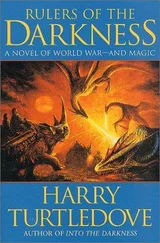He also noticed Fernao scrutinizing him, which he wasn’t supposed to do. He smiled again, a surprisingly charming smile from a man less than handsome. After another sip at his hot cider, he said, “Am I correct in understanding, sir, that you are more than a little skilled at getting into and out of places where others might possibly not want to go?”
A trip into Feltre despite the anger of the Sibian Navy qualified Fernao to answer aye. He did nothing of the sort, instead saying, “You are correct in understanding, sir, that my business is my business—and no one else’s unless I choose to make it so.”
The fellow across the table from him laughed gaily, as if he’d said something very funny. Fernao knocked back his wine—the taverner, no doubt, would be pleased—and started to get to his feet. Where nothing else had, that made the stranger lose his too-easy smile. “Please, sir, don’t go yet,” he said in a voice that, despite its polite tones, held iron underneath.
His right hand rested, broad palm down, on the tabletop. He might have had some sort of weapon—a cut-down stick, perhaps a knife under it. But when he lifted it, taking care that Fernao and no one else could see •what he did, he revealed not a weapon but the sparkle of gold.
Fernao sat back down. “You have engaged my attention, at least for the time being. Say on, sir.”
“I thought that might do the trick,” the stranger said complacently. “You Lagoans have the name of being a mercenary folk. That you trade with both sides during the current unpleasantness does nothing to detract from it.”
“That we trade with both sides shows a certain common sense, in my view,” Fernao said. “That you sneer at my people does nothing to attract me to you. And, if we are to continue this discussion, give me a name to call you. I do not deal with nameless men.” Unless I have no choice, he thought but did not say aloud. Here, though, the choice was his.
“Names have power,” the man across the table from him observed. “Names especially have power in the mouth of a mage. But you may call me Shelomith, if you must stick a handle on me as if I were a hot pot.”
“If whatever notion you have in mind could not burn me, you would have approached me in a different way,” Fernao said. And Shelomith was not the name with which the stranger had been born. It sounded like one the barbarous Ice People used. Whatever blood ran in Shelomith’s veins, it was not from that stock. Fernao went on, “You have shown me gold. I presume you have in mind paying me some. How do you expect me to earn it?”
“This for listening,” Shelomith said, and shoved the coin he had concealed across to the mage. It showed the fuzzy-bearded king of Gyongyos, whose image was bordered by an inscription in demotic Gyongyosian script, which Fernao recognized but could not read. He did not think the coin’s origin said anything about what Shelomith had in mind. Gold circulated freely all across the world, and a crafty man could use it to conceal rather than to reveal. As if to point in that same direction, Shelomith spoke again: “For listening—and for your discretion.”
“Discretion goes only so far,” Fernao said. “If you ask me to betray my king or my kingdom, I will do nothing of the sort. I will shout for a constable instead.”
He wondered if Shelomith would find urgent business elsewhere on hearing that. The stranger only shrugged wide shoulders. “Nothing of the sort,” he said in reassuring tones. Of course, he would have said the same thing had he been lying. He went on, “You may remain apart from the proposal I shall put to you, but it could not offend even the most delicate sensibility.”
“Such a statement is all the better for proof,” Fernao said. “Tell me plainly what you want from me. I will tell you if you may have it and, if so, at what price.”
Shelomith looked pained. Fernao got the idea that asking him to speak plainly was like asking the Falls of Leixoes to flow uphill. At last, after another long pull at his cider, he said, as he had before, “You are, are you not, good at getting into and out of tight places?”
“This is where we began.” The mage made as if to get up again, this time with the goldpiece in the pouch on his belt. “Good morning.”
As he’d more than half expected, another goldpiece appeared under Shelomith’s palm. Fernao kept rising. “Good my sir,” Shelomith said plaintively. “Only sit, and be patient, and all will be made clear.” Fernao sat. The stranger passed him the second goldpiece. He made it disappear: a good, profitable morning. Shelomith looked even more pained. “Are you always so difficult?”
“I make a point of it,” Fernao said. “Are you always so obscure?”
Shelomith muttered under his breath. To Fernao’s disappointment, he could not make out which language the stranger used when angry. He sat quietly and waited. Maybe Shelomith would feed him still more gold for doing nothing. Instead, with the air of a man yielding himself up to a dentist, Shelomith said, “Does it not wring your heart to see a crowned king trapped in exile far from his native land?”
“Ah,” Fernao said. “Sits the wind so? Well, a question for a question: don’t you think King Penda is a lot happier sitting in exile in Yanina than he would be had the Algarvians or Unkerlanters caught him in Forthweg?”
“You are as clever as I hoped,” Shelomith said, slapping on the flattery with a broad brush. Fernao would have been naive to fail to get his drift. “The answer to your question is aye, but only to a degree. He is not only in exile; he might as well be in prison. King Tsavellas holds him close, so he can yield him up to King Swemmel if the Unkerlanter’s pressure grows too great.”
“Ah,” Fernao repeated. He fell into slow, sonorous Forthwegian: “And you want him taken beyond King Swemmel’s reach.”
“Even so,” Shelomith answered in the same language. “Having a mage with us will make us more likely to succeed. Having a Lagoan mage with us will make it less likely that King Swemmel can take reprisal against him.”
“A distinct point, from all I have heard of King Swemmel,” Fernao said. “The next question is, what makes you think I am the Lagoan mage you want?”
“You have gone into Algarve in time of war, why should you not go into Yanina in time of peace? You are a mage of the first rank, so you will have the strength to do whatever may be needed. You speak Forthwegian, as you have shown. I would be lying if I said you were the only mage at whom we are looking, but you are the man we would like to have.”
His friends were probably saying the same thing to the other candidates. As soon as someone was rash enough to say aye, they would lose interest in the others. Fernao wondered if he was rash enough to say aye. He’d never been to Yanina. Getting there would be easy enough, if King Swemmel didn’t invade; the small kingdom between Algarve and Unkerlant remained nervously neutral. Getting out—especially getting out with King Penda—was liable to be something else again.
Of course, Shelomith was liable not to care whether Fernao got out or not, so long as Penda did. That might make life interesting in several unpleasant ways. A sensible man would pocket the two Gyongyosian goldpieces and go about his business.
“When do we sail?” Fernao asked.
Marshal Rathar endured the search to which King Swemmel’s bodyguards subjected him with less aplomb than he usually showed. He had not conceived so high an opinion of himself as to think he was above searching. But he did begrudge the time he had to waste before being admitted to his sovereign’s presence.
Once he’d got past the guards, he also begrudged the time he had to. spend knocking his head against the carpet before the king. Ceremony was all very well in its place; it reminded people what a great and mighty sovereign ruled them. Rathar, though, already knew that well. Wasting time on ceremony, then, struck him as inefficient.
Читать дальше












